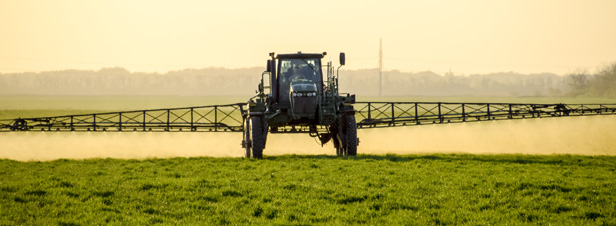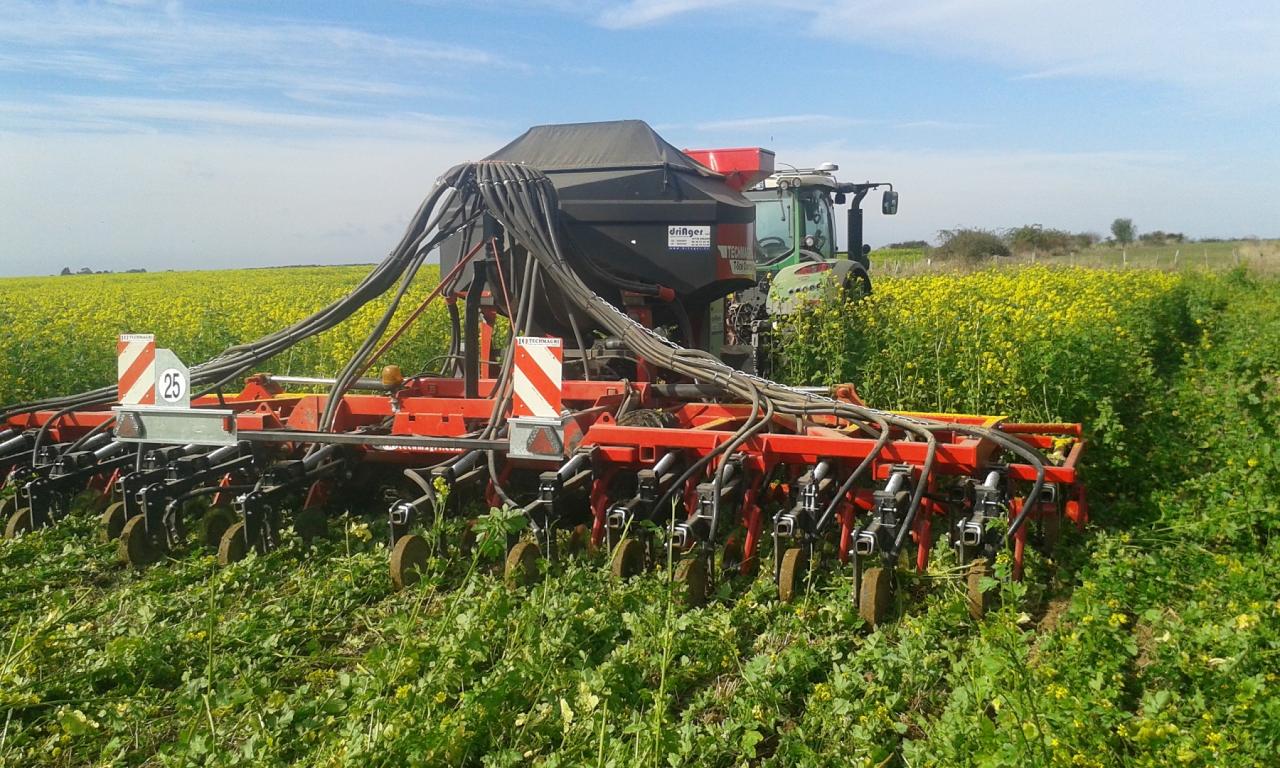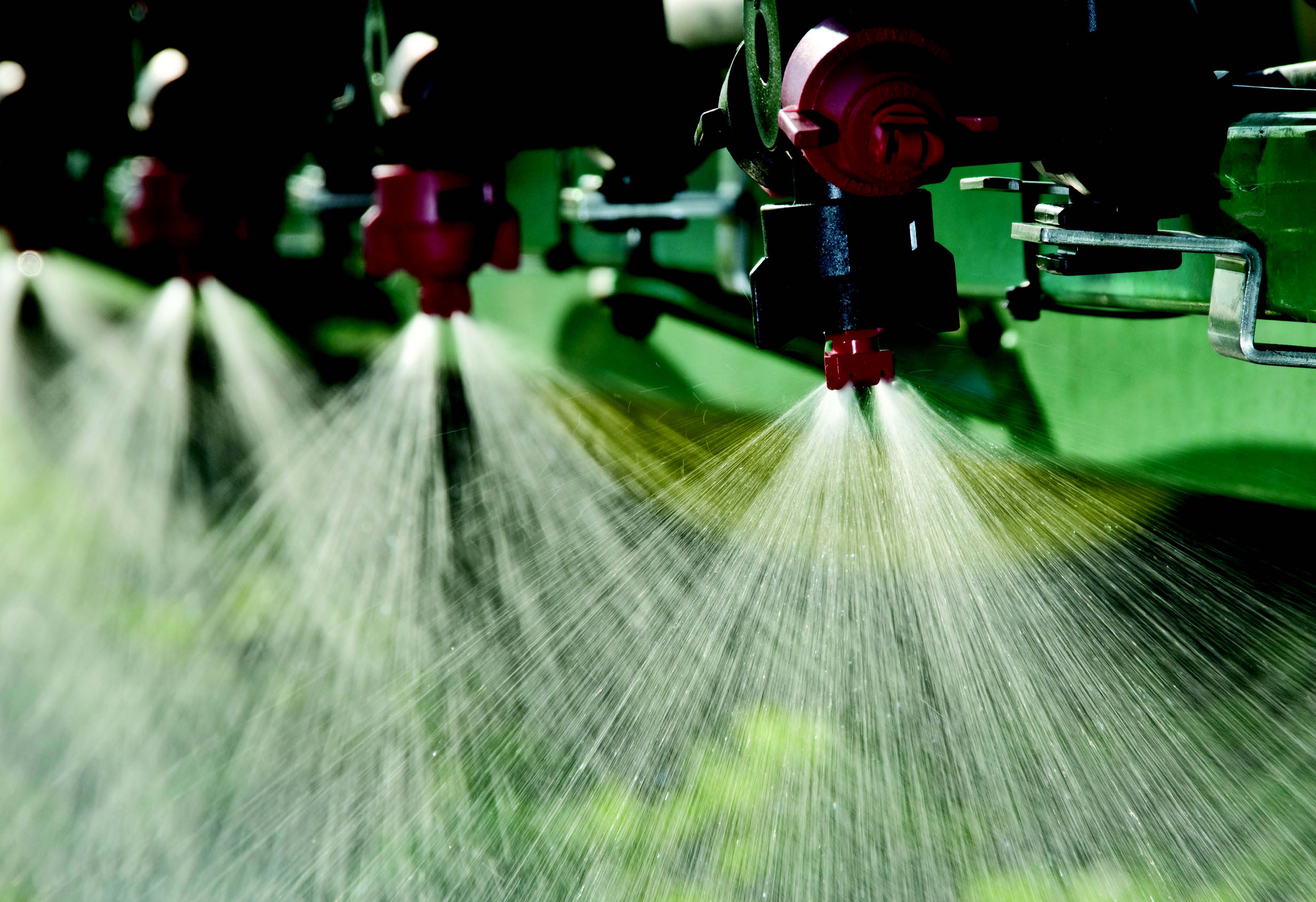BAN
THE GLYPHOSATE, AND THEN...?
Under
this title Mathieu, on the web page Graines de Mane, published on February 15,
2017 a beautiful article, concise, on the questions that leaves in the
profession, the possible future ban of glyphosate.
"In the past few days, the
serial on the suspension of glyphosate, Monsanto's star herbicide, has
restarted. About 40 NGOs launched a European petition on 8 February calling for
"the ban on glyphosate, in accordance with the European provisions on
pesticides, which prohibit the use of carcinogenic substances in humans".
This happens, in particular, after WHO has classified carcinogenic glyphosate
and the fuzziness of European authorities on the renewal of its employment authorization
in Europe. In the end, in June 2016, the European Union finally decided to
extend its use for eighteen months until a new scientific opinion was
published.
Pending a possible suspension of
authorization of the molecule, the question on farms thus arises in the
following way: how to do without
glyphosate? Some farmers can do without it or reduce doses, but its status
as the best-selling herbicide in the world shows how many agricultural systems
depend on it ... And not just intensive farming systems. Thus, some farmers,
although engaged in virtuous environmental practices, continue to use this
product at low doses. This is the case, for example, with conservation
agriculture, which aims to keep a soil constantly covered by vegetation and not
to plow the soil to preserve as much as possible its structure, the life it
harbors (earthworms and diverse fauna) and limit erosion. These techniques
represent a solution to increase soil fertility and thus the long-term
sustainability of agricultural systems. By eliminating tillage, farmers improve
the health of their soils, but don't have it as a tool for an effective weed
management. The success of these crops therefore depends to a large extent on
the use of herbicides, including glyphosate.
For these
farmers, the removal of glyphosate would thus lead to a technical dead end
which could result in the abandonment of their virtuous environmental
practices.
The concerns of civil society are
perfectly legitimate and farmers are changing their techniques to meet them.
Being aware of the effects of agricultural practices on the environment or
health makes it possible to enlighten our consumer choices on a daily basis.
Knowing how the foods that are found on our plates are produced is therefore
paramount. Understand the consequences of citizens' wishes on the reality of
the technical functioning of farms as well. The debate over the removal of
glyphosate calls for another: the urgent need to find alternatives that allow
growers to avoid jumping into the unknown, while responding to new
environmental challenges in agriculture. Every day, producers, researchers and
agricultural development organizations innovate for more virtuous forms of
agriculture. The announced suppression of glyphosate will be all the more
effective if sustainable alternatives in agronomic, environmental and economic
terms are developed. Banning is one
thing, offering alternatives is even better. This is no doubt the real
challenge of the actors of agriculture in the years to come. "
Since the
publication of this article, much has been said about glyphosate, from the
French Minister's announcement of the negative vote of France until the
announcement by the same minister of a proposal of a shorter renewal, in order
to have time to look for alternatives.
We have also
seen the WHO announce that glyphosate is probably not carcinogenic, thus
countering the classification of its own agency, the IARC.
We have seen
all food safety agencies in the world, and all uncommitted scientists (without
private funding or political or ideological pressure) strongly claim that
glyphosate, under normal conditions of use, is not risky for health or the
environment.
It's also
true that it's very difficult to know (and this is moreover carefully
calculated), among the thousands of published studies, which of them are
objective (a minority), and which of them are financed by one side or the other
(or whose scientific committees are oriented, as it was the case for IARC), and
which are the majority.
Glyphosate
file is a rigged and manipulated file, falsified from the beginning. This
herbicide, the most widely used in the world and also the most harmless
(according to all objective scientific studies) has become the scapegoat, an
unwitting symbol of the fight against GMOs and against Monsanto (who has not
owned it since 17 years and generates only +/- 15% of its profits from it https://www.fool.com/investing/2016/05/26/how-much-money-does-monsanto-make-from-roundup.aspx), becoming the target of a
vast ideological manipulation.
We
could longly argue on the reasons for this incredible propaganda, skilfully
using all means at its disposal (radio, television, petitions, demonstrations,
social networks and so on) worthy of the darkest hours of the worst
dictatorships of the recent history, or closer to us, of the worst citizen or
independence movements such as that of Catalonia (very skilful in its perverted
role of the Catalan David against the Spanish Goliath), or also the Brexit.
Poster
of Chinese propaganda from the time of the Great Proletarian Cultural
Revolution, showing intellectuals as responsible for the evils of the country.
To
make things clear, let's remember this statement by Mr. Bernard Url, Executive
Director of EFSA, who explained on 1 December 2015 to the European Parliament
to explain the position of EFSA:
“The letter of 96 persons were
mentioned very often. For me this a very good example on how different the two
organizations work. We work on glyphosate with 100 scientist from the member
states. They see the evidence, they contribute, they challenge, they are in
teleconferences, it’s the peer review process, and with these 100 scientists
together we were able to produce this.
We did not ask these scientists to
sign a letter whether they like or not the outcome. And one member of the
parliament put it very rightly. She has said: 96 scientists feel uncomfortable
with EFSA’s opinion. And it’s about that. People that have not contributed to
the work, that have not seen the evidence most likely, that have not had the
time to go into the detail, that are not in the process, have signed a letter
of support.
Sorry to say
that, for me with this you leave the domain of science, you enter into the
domain of lobbying and campaigning, and this is not the way EFSA goes. For me
this is the first sign of the Facebook age of science. You have a scientific
assessment, you put it on Facebook, you count how many people like it. For us
this is no way forward. We produce a scientific opinion, we stand for it, but
can’t take into account whether it will be liked or not.”
This is a
real problem. If a scientific report runs counter to public opinion, which in
general reacts only emotionally, it's immediately vilified, massacred, and
scientists (and their supporters and defenders too) suspected or clearly
accused of being corrupted by someone.
We are sinking into a decadence
that is on the way to ruining our civilization.
But that is
not the point.
As far as
glyphosate is concerned, the damage is done. It will not be possible to
reverse. Remember the Alar affair, which nevertheless took place well before
the existence of social networks and of the great fashion of "citizen
petitions". We are in a similar manipulation of opinion, but much more
serious. http://culturagriculture.blogspot.com.es/2015/02/38-alar-scare.html
The question
is no longer whether glyphosate will be banned or not, sooner or later it will
be. Rather, it's how farmers will have to adapt to its disappearance, legal or
demanded by markets, too frightened by consumers’ opinion, who may turn to
other brands if they learn that their food could have been grown with
glyphosate.
I
have no illusions. I expect to see glyphosate, hitherto allowed in all customer
specifications (except for organic production, of course), go to the status of
inadvisable or prohibited, with or without legal justification.
However, the
future glyphosate substitutes, which will not fail to arrive, will necessarily
be 5 to 6 times more expensive. That's normal, that's the rule. But it's
considerably changing the data of the problem for farmers, who often have a
hard time making a profit on their jobs.
It's
therefore very urgent to find alternatives. I hope the European Commission will
have the intelligence not to abandon the molecule in too short a time, and will
promote the search for alternative methods.
A very
interesting article on the subject was recently published in the Christian
periodical "La Croix" https://www.la-croix.com/Sciences-et-ethique/Sciences-et-ethique/Comment-passer-glyphosate-2017-10-03-1200881487
It shows the
interesting testimony of a young French farmer, deeply convinced and involved
in a new conception of agriculture. He has worked there for a long time and
explains:
“I was told I was mad, that I could
not succeed. But after several years of work and adjustments, that’s it: I had
good results last year, I expect them to confirm but I am confident.”
Yet he is
aware that this transition is difficult:
"I did not get there
overnight. And if I remain convinced that we'll be able to avoid the use of
herbicides with plant cover, a brutal ban would be a mistake."
I invite my
non-European readers not to doubt it. If glyphosate is banned in the European
Union, the world's largest food market, the rest of the world will also come to
it, in the short or long term.
The search
for alternative solutions will help safeguard virtuous farming techniques, such
as conservation agriculture and integrated production.
It's not permissible, for dark
ideological reasons, to question everything that is a guarantee of food
security, food quality and safety, and reducing the effects of agriculture on
global warming.
European
agriculture is the most efficient, the healthiest and most respectful in the
world. People come from all over the world to learn the methods and techniques
used.
It will
continue to evolve and adapt to all situations, as it has always done. But any
profound change requires time, training, costs, research, and investment.
Many crucial
questions remain to be made, many essential points have probably not been
envisaged, or not enough deeply.
Will
European agriculture lose competitiveness in front of non-Community
competition?
Will the
players of commercial food channels play the game of rising costs, respecting
the cost prices of farmers?
Will
consumers be prepared to accept a probable increase in the prices of their
food?
Will the
markets prefer to buy non-EU products, cheaper but often less safe, in order to
preserve their margins without increasing consumer prices?
The future of the quality of
European food is at stake, but not many people seem to realize it.






Aucun commentaire:
Enregistrer un commentaire